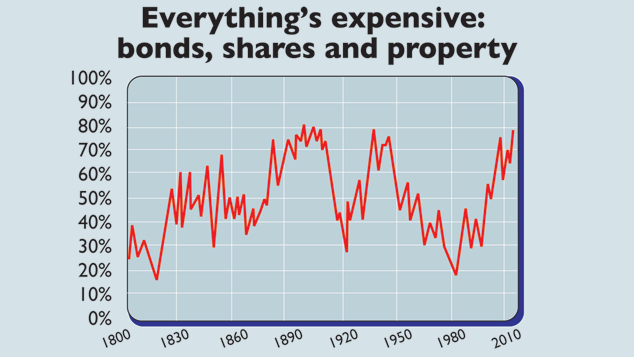What will happen as US interest rates rise?
Interest rates have been so low for so long, asset prices are likely to come under pressure.

Get the latest financial news, insights and expert analysis from our award-winning MoneyWeek team, to help you understand what really matters when it comes to your finances.
You are now subscribed
Your newsletter sign-up was successful
Want to add more newsletters?

Twice daily
MoneyWeek
Get the latest financial news, insights and expert analysis from our award-winning MoneyWeek team, to help you understand what really matters when it comes to your finances.

Four times a week
Look After My Bills
Sign up to our free money-saving newsletter, filled with the latest news and expert advice to help you find the best tips and deals for managing your bills. Start saving today!

There is one big question on investors' minds at present: what will happen when the Federal Reserve, the US central bank, raises interest rates for the first time in almost a decade? This is a particularly hot topic because interest rates have remained at near-zero levels in the developed world for an unusually long time. They were slashed to help rescue the economy during the financial crisis, and have stayed low as the economy remains unusually weak.
Assets such as equities, bonds and housing, however, have had strong runs in recent years and are widely deemed historically expensive. But just how pricey are they, and what tends to happen to such asset prices when interest rates rise, as must happen sooner or later?
Deutsche Bank's Long-Term Asset Return Study looked at 15 developed countries with a consistent long-term history across equities, bonds and housing. Data for housing go back to the 1970s; for bonds and stocks, they cover up to two centuries. For bonds, the study looks at nominal and real (ie, after accounting for inflation) yields; for housing, the difference between prices and the inflation-adjusted trend line; and for stocks, nominal GDP, a good proxy for earnings.
MoneyWeek
Subscribe to MoneyWeek today and get your first six magazine issues absolutely FREE

Sign up to Money Morning
Don't miss the latest investment and personal finances news, market analysis, plus money-saving tips with our free twice-daily newsletter
Don't miss the latest investment and personal finances news, market analysis, plus money-saving tips with our free twice-daily newsletter
The results were calculated as percentiles relative to the long-term trend, orlong-term average direction of prices.For bonds, the figure is 99%, meaning that government debt is very nearly at its most expensive level ever (that would be 100%) compared to its trend.For stocks, the figure is around 85%.Put bonds and equities together across all 15 countries, and the figure is well over 90%, a record.
House prices are at 50%; add them into the overall mix, and we are left with a figure of 80%. These figures are represented in the chart (above).So average valuations are close to the highest they've ever been relative to their long-term trend higher than in 2007 and 2000. We have, says Deutsche, reached "peak asset prices".
This time it's different
But as Deutsche points out, this time it's different. It's the first time since World War II that we have suffered a huge financial crisis as well as a recession, which has meant that the recovery has been unusually slow, as everyone has cut back on borrowing. One reason growth always resumed quickly following post-warslowdowns was that we just went out and borrowed more. But now this "supercycle of increasing leverage" is over as we're all maxed out.
No wonder, then, that it's been 74 months and counting since the end of the last recession, and we still haven't had a rate hike. The median time from recession end to the start of the tightening cycle is 30 months. With developed economies fragile and still soaked in debt, the Fed may lift the price of money much more slowly than usual and not lift it nearly as high as in previous cycles.
Still, given how used to zero interestrates and printed money markets have become, any change from this policy seems likely to put assets under pressure, reckons Deutsche. A return of inflation is another problem to look out for, as it would give central banks far less scope to keep rates low and could necessitate faster hikes than expected.
Furthermore, with assets so historically expensive, they may be more vulnerable than usual to dearer money. The outlook is, then, unusually murky. But at MoneyWeek, we think it's hard to see the bull market in stocks, bonds or property surviving a rise in interest rates, no matter how slow and gradual the rises are planned to be.
Get the latest financial news, insights and expert analysis from our award-winning MoneyWeek team, to help you understand what really matters when it comes to your finances.

-
 Should you buy an active ETF?
Should you buy an active ETF?ETFs are often mischaracterised as passive products, but they can be a convenient way to add active management to your portfolio
-
 Power up your pension before 5 April – easy ways to save before the tax year end
Power up your pension before 5 April – easy ways to save before the tax year endWith the end of the tax year looming, pension savers currently have a window to review and maximise what’s going into their retirement funds – we look at how